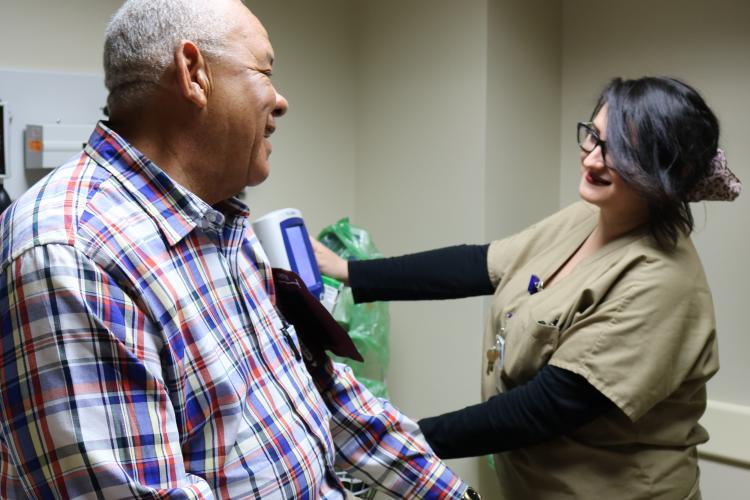
Senior citizens are the fastest-growing segment of the population in the United States and the Fort Worth area is no exception.
According to the Fort Worth Star-Telegram, Fort Worth has the fastest-growing senior population in the country with 146,000 new geriatric residents last year. With an expanding population of older adults in the area, JPS Health Network is poised to fill the need with a wide line of services designed to keep seniors healthier longer, according to Will Callans, Service Line Manager for Geriatrics at JPS Health Network.
“More than 10,000 American adults turn 65 every day,” Callans said. “We’ve heard for years that ‘the Baby Boomers are coming.’ The Baby Boomers aren’t only coming – they’re here right now. Fortunately, we’ve been preparing for it.”
Callans said the number of senior citizens relying on JPS for care has increased dramatically in recent years. He doesn’t expect that trend is going to change any time soon.
“We’re seeing 11 percent more people 65 years old and older touching our services this year over last,” said Callans. “Some people think when you turn 65, you just continue on with the same doctors and services you’ve always had. But like children move from pediatricians to adult doctors when they grow up, adults need to transition to geriatricians who understand how needs change as people get older.”
JPS only offers geriatricians who are in tune with the special needs of geriatric patients and its facilities have been updated to handle the specific needs of older Americans. In the Magnolia Health Center, the facilities are designed with seniors in mind. The halls are wide and feature smooth floors without door sills to eliminate trip hazards and make it easier to get around in a wheel chair. Motorized examination tables can be lowered to within 18 inches of the floor for people with limited mobility to get on the table. The table then moves to put the person in the right position for an examination. Sturdy railings line the halls to prevent falls. There’s even a wheel-on scale so patients don’t have to get out of their wheelchair to be weighed.
In 2015, JPS became the first public healthcare organization in North Texas to receive NICHE (Nurses Improving Care for Healthsystem Elders) designation, a special recognition for facilities that work to elevate healthcare services for seniors. JPS also operates the only geriatric trauma center in Tarrant County which treats older Americans suffering from life-threatening injuries.
Seniors who must make an extended stay in the hospital have special needs compared to their younger counterparts. That’s why JPS created HELP, the Hospital Elder Life Program, in which hospital volunteers spend personal time with geriatric patients. Having someone to talk to, play a game of cards with or to ask questions can keep senior minds sharp, shorten hospital stays and help to fend off depression.
In addition to offering care for seniors in JPS facilities, home healthcare services allow geriatric patients to receive care in the comfort of their own homes.
Some health issues that affect seniors more than any other age group, according to AgingCare.com:
- Arthritis – The most common problem older Americans deal with on a daily basis, according to the Centers for Disease Control, 49.7 percent of adults over 65 struggle with arthritis. Not only can it be painful, the disease limits mobility, decreasing activities of people who suffer from it, which can lead to other serious health problems.
- Dementia including diseases like Alzheimer’s – About 100,000 people die from Alzheimer’s each year. About 10 percent of people over the age of 65 have the condition.
- Delirium is a serious disturbance of a person's mental capabilities often sparked by a medical issue ranging from chronic illness, infection, or as a reaction to medication. Often confused with dementia, a gradual decline of cognitive ability that is irreversible, it is often possible to recover from delirium. But it's important for caretakers to recognize symptoms and report them to their loved one's healthcare provider immediately.
- Osteoporosis – According to the National Osteoporosis Foundation, more than 54 million Americans over 50 are more vulnerable to broken bones due to the disease. By 2020, that numbers is expected to reach 64.4 million.
- Falls – More than 2.5 million people 65 and over in the United States visit an emergency room each year because of fall-related injuries. Most falls occur in the senior’s home and could be prevented with proper preparation.
- Shingles – One of three people over 60 get shingles, more than half of the population has dealt with it by the time they’re 80.
In addition to helping patients navigate the physical issues associated with aging, JPS also offers services that give geriatric patients peace of mind. Social workers assist seniors on a fixed income to get the things they need to be healthy like pharmacy vouchers for their medication, bus passes to help them get to and from their healthcare appointments and getting them set up with things like a Meals on Wheels program so older Americans get proper nutrition. Assistance is also offered in helping seniors protect themselves from elder abuse -- which can include physical or mental mistreatment -- and things like being taken advantage of financially.
“Something we’re really focused on is the continuum of care,” Callans said. “We’re here to help people age gracefully by offering care through every stage of their life and in every aspect of their care.”
